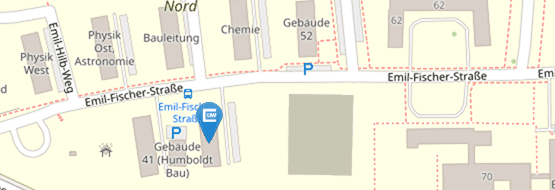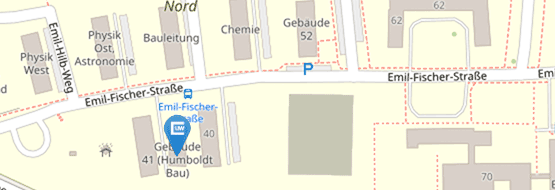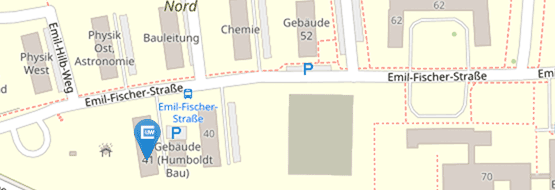Mathematical Data Science (Bachelor)
Bachelor's programme in Mathematical Data Science
| Degree: | Bachelor of Science |
| Target duration: | 6 Semester |
| Study beginning: | Winter semester |
| Prerequisite: | Free admission |
| Credits: | 180 ECTS points |
| Target group: | Students who want to study mathematics with a focus on data science |
| Qualification targets: | Qualification targets Bachelor Mathematical Data Science (180 ECTS) |
| Accreditation: | Program accredited till September 30, 2028 |

Prospective graduates of Mathematical Data Science should
- become familiar with mathematical reasoning and proof,
- acquire comprehensive knowledge of the methods of data science,
- become familiar with concepts of artificial intelligence and machine learning,
- develop competence in the conception and implementation of problem-solving strategies,
- develop the ability to structure complex contexts and apply mathematical methods and algorithms to problems.
Studying Mathematical Data Science promotes the
- ability to think abstractly and to explore complex issues,
- perseverance and creativity in solving problems,
- knowledge and skills to implement mathematical methods algorithmically and to apply them to practical problems,
- openness to work interdisciplinarily and in a team.
Mathematicians generally have excellent career prospects, regardless of the economic situation. In recent years, more and more jobs have been advertised in the field of "data science", which means that the focus is particularly on working with data. In this degree programme, you will acquire skills in the development and algorithmic implementation of methods to process data and to efficiently extract information from data. A completed degree programme in "Mathematical Data Science" certifies that graduates have the skills trained in mathematical degree programmes
- to quickly familiarise themselves with complex contexts,
- to think in a structured manner,
- to identify the core of a problem,
- to find creative approaches to solutions,
- to apply profound mathematical expertise.
In addition, the Mathematical Data Science degree programme focuses on working with data, which is of great importance in most modern professional fields. The mathematical education with an orientation in applied mathematics and paired with knowledge of the basics from computer science results in a ticket to a crisis-proof job.
Structure
-
The bachelor's degree programme Mathematical Data Science is divided into so-called modules. Each module is completed with a module examination, which covers the contents of one or two lectures. Credit points (ECTS) are awarded for passed examinations (not to be confused with grades), which correspond to a workload of about 30 hours each. In each semester, 30 ECTS, i.e. a total of 180 ECTS, are allocated.
-
The first part of the degree programme essentially follows a fixed curriculum. Here you will learn the basics of mathematics and basic knowledge of computer science, especially artificial intelligence. In the second part of the programme, you can choose lectures and seminars according to your interests and specialisations. At the end of the programme, you will complete your written Bachelor's thesis under the supervision of a lecturer.
- From the fourth semester onwards, the increased practical relevance becomes a focus of this degree programme. To this end, you will take courses that focus on the application of data science to practical problems. What you learn is used in particular in two labs, i.e. practical courses on applied mathematics, and an industrial internship, and is deepened in a practical way.
- The programme consists of lectures with exercises, a seminar, the labs and the Bachelor's thesis. In addition, there are subject-specific The programme consists of lectures with exercises, a seminar, the labs and the Bachelor's thesis. In addition, there are subject-specific transferable skills (including the industrial internship) and freely selectable general transferable skills (e.g. language courses).
Study plan (overview of modules to be completed, in german language)
Minimum ECTS score requirement (Grundlagen- und Orientierungsprüfung, GOP)
After the second semester, the successful completion of a module from one of the two subfields Analysis or Linear Algebra is counted as satisfying the minimum ECTS score requirement. If this cannot be fulfilled (and only then), the successful completion of at least one of the modules Overview Analysis or Overview Linear Algebra must be proven after the third semester. If this cannot be achieved either, the bachelor's degree programme is regarded as having been definitively failed.
Degree
If you have earned 180 ECTS credits under the examination regulations, you will receive the academic degree Bachelor of Science.
Academic and Examination Regulations
- General academic and examination regulations (ASPO)
- Subject-specific provisions for the bachelor's degree programme Mathematical Data Science (FSB; in german language only)
Among other things, the examination board is responsible for
- recognition questions at the beginning of the degree programme for achievements acquired in previous study programmes or at another study location,
- recognition questions in the current degree programme,
- equal opportunities issues.
There are eleven compulsory modules in the bachelor's degree programme Mathematical Data Science:
- Overview Analysis (Gesamtüberblick Analysis) (13 ECTS)
- Overview of Linear Algebra (Gesamtüberblick Lineare Algebra) (13 ECTS).
These involve an oral examination in Analysis 1 and 2, and Linear Algebra 1 and 2 respectively.
In addition:
- Stochastics 1 ( 10 ECTS)
- Numerical Mathematics 1 (10 ECTS)
- Mathematical Foundations of Data Science (10 ECTS)
- Seminar (5 ECTS)
- Applied Stochastics Lab (6 ECTS)
- Machine Learning and Numerics Lab (6 ECTS)
- Algorithms, AI and Data Science 1 (10 ECTS)
- Algorithms, AI and Data Science 2 (10 ECTS)
- Data Science & Machine Learning (5 ECTS).
The mandatory elective modules are divided into five subfields. A total of 50 ECTS points must be earned in this area.
- Fundamentals Analysis (5 ECTS, ungraded)
- Analysis 1 (5 ECTS)
- Analysis 2 (5 ECTS)
- Fundamentals Linear Algebra (5 ECTS, ungraded)
- Linear Algebra 1 (5 ECTS)
- Linear Algebra 2 (5 ECTS)
- Mathematics (20 - 40 ECTS, graded)
- Stochastics 2 (10 ECTS)
- Numerical Mathematics 2 (10 ECTS)
- Optimization for Machine Learning (10 ECTS)
- Mathematics of Machine Learning (10 ECTS)
- Modelling and Scientific Computing (10 ECTS)
- Advanced Analysis (10 ECTS)
- Introduction to Algebra (10 ECTS)
- Introduction to Differential Geometry (10 ECTS)
- Introduction to Projective Geometry (10 ECTS)
- Introduction to Complex Analysis (10 ECTS)
- Geometric Analysis (10 ECTS)
- Ordinary Differential Equations (10 ECTS)
- Introduction to Discrete Mathematics (10 ECTS)
- Introduction to Functional Analysis (10 ECTS)
- Introduction to Partial Differential Equations (10 ECTS)
- Introduction to Number Theory (10 ECTS)
- Applied Algebra (10 ECTS)
- Introduction to Topology (5 ECTS)
- Introduction to Stochastic Financial Mathematics (10 ECTS)
- Computer Science (0 - 20 ECTS)
- Software Engineering for Artificial Intelligence and Data Science (5 ECTS)
- Programming practical for Mathematical Data Science (5 ECTS)
- Databases (5 ECTS)
- Fundamentals of Programming (5 ECTS)
- Deep Learning (5 ECTS)
- Introduction to Human-Computer Interaction (5 ECTS)
- Computer Vision (5 ECTS)
- Natural Language Processing (5 ECTS)
- Statistical Network Analysis (5 ECTS)
- Cognitive Systems (5 ECTS)
- Theory of Machine Learning (5 ECTS)
- Selected Foundations of Artificial Intelligence and Data Science 1 (5 ECTS)
- Selected Foundations of Artificial Intelligence and Data Science 2 (5 ECTS)
- Applications (0 - 10 ECTS, graded)
- Applications of Data Science in other disciplines 1 (5 ECTS)
Applications of Data Science in other disciplines 2 (5 ECTS)
- Applications of Data Science in other disciplines 1 (5 ECTS)
The transferable skills are divided into general transferable skills (5 ECTS) and subject-specific transferable skills (15 ECTS).
For the general transferable skills, you can choose from a huge selection of suitable modules from all faculties. Language courses are very popular. You can find the current list on this Page.
The subject-specific transferable skills are further divided into
- Compulsory modules (11 ECTS)
- Preliminary course (2 ECTS)
- Propaedeutic course (2 ECTS, 1st semester)
- External internship (7 ECTS)
- Mandatory elective modules (4 ECTS)
- Computer-oriented mathematics (4 ECTS)
- Programming course (3 ECTS)
- Supplementary Seminar in Mathematics (4 ECTS)
- History of Mathematics (5 ECTS)
- Mathematical writing (5 ECTS)
- School Mathematics from a Higher Point of View (5 ECTS)
The bachelor's thesis (BAT, 12 ECTS) is the last major examination in your bachelor's degree programme. With this written work, you are supposed to show that you are able to scientifically work on a (mathematical) problem within a fixed period of twelve weeks. No scientific innovations are demanded, but you are expected to proceed in a scientific manner.
At latest, you should start your BAT twelve weeks before the end of your 8th semester, so that you can just about make use of the full preparation time to hand in the work before the start of your 9th semester (with the start of the 9th semester, your Bachelor's degree programme is considered to have been failed for the first time!)
In order to find a topic for the BAT, you should contact a lecturer according to your mathematical interests (see overview of the chairs of the Institute of Mathematics) and discuss it directly with him/her (your own suggestions are possible!). Potential supervisors are all lecturers of mathematics.
Once you have found a supervisor and a topic for your BAT, print out this form, fill it out together with your supervisor and hand it in to Ms. Schmid (Mathematik Ost, room 00.016). This makes the topic of your BAT and the date of submission (date of assignment of the topic + 12 weeks) official and binding.
Only in well-founded cases (such as, e.g., certified inability to take the exam) the preparation time can be extended upon application to the examination board and in consultation with the supervisor.
For regulations concerning passing the thesis to the university see here.






